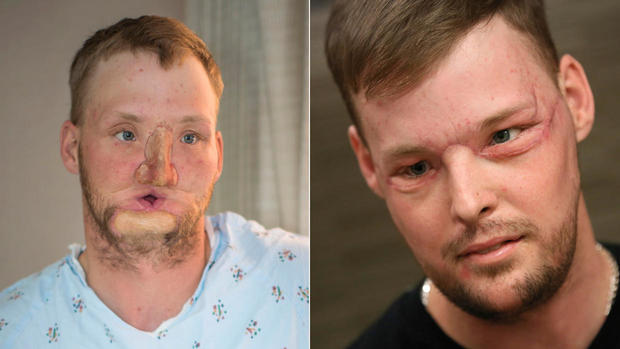Quadruple amputee veteran receives double arm transplant
A soldier who lost all four limbs when a roadside bomb exploded in 2009 has undergone a double arm transplant.
Brendan Marrocco, a 26-year-old from New York, had the operation on Dec. 18 at Johns Hopkins Hospital in Baltimore, his father said Monday.
He also received bone marrow from the same dead donor who supplied his new arms. That novel approach is aimed at helping his body accept the new limbs with minimal medication to prevent rejection.
The military is sponsoring operations like these to help wounded troops. About 300 have lost arms or hands in the wars.
"He was the first quad amputee to survive" from the wars in Iraq and Afghanistan, and there have been four others since then, said Brendan Marrocco's father, Alex Marrocco. "He was really excited to get new arms."
The Marroccos want to thank the donor's family for "making a selfless decision ... making a difference in Brendan's life," the father said.
Surgeons plan to discuss the transplant at a news conference with the patient on Tuesday.
The 13-hour operation was led by Dr. W.P. Andrew Lee, plastic surgery chief at Johns Hopkins, and is the seventh double-hand or double-arm transplant done in the United States. Lee led three of those earlier operations when he previously worked at the University of Pittsburgh, including the only above-elbow transplant that had been done at the time, in 2010.
There have been several double arm transplants in recent years. A German farmer was the first to receive a double arm transplant in 2009. A Texas mother who lost all four limbs to a Streptococcal A flesh-eating infection during the birth of her third child was declared viable for the surgery in September 2012, and doctors are still searching for a suitable candidate.
- Texas mother of three to get double arm transplant
- Man gets double arm transplant in Mexico
- Double amputee armed With optimism
Marrocco's "was the most complicated one" so far, Lee said in an interview Monday. It will take more than a year to know how fully Marrocco will be able to use the new arms, Lee said.
"The maximum speed is an inch a month for nerve regeneration," he explained. "We're easily looking at a couple years" until the full extent of recovery is known.
While at Pittsburgh, Lee pioneered the novel immune suppression approach used for Marrocco. The surgeon led hand transplant operations on five patients, giving them marrow from their donors in addition to the new limbs. All five recipients have done well and four have been able to take just one anti-rejection drug instead of combination treatments most transplant patients receive.
Minimizing anti-rejection drugs is important because they have side effects and raise the risk of cancer over the long term. Those risks have limited the willingness of surgeons and patients to do more hand, arm and even face transplants. Unlike a life-saving heart or liver transplant, limb transplants are aimed at improving quality of life, not extending it.
Quality of life is a key concern for people missing arms and hands - prosthetics for those limbs are not as advanced as those for feet and legs.
Lee has received funding for his work from AFIRM, the Armed Forces Institute of Regenerative Medicine, a cooperative research network of top hospitals and universities around the country that the government formed about five years ago. With government money, he and several other plastic surgeons around the country are preparing to do more face transplants, possibly using the new minimal immune suppression approach.
Marrocco expects to spend three to four months at Hopkins, then return to a military hospital to continue physical therapy, his father said. Before the operation, he had been living with his older brother in a handicapped-accessible home on New York's Staten Island built with the help of several charities.
The home was heavily damaged by Superstorm Sandy last fall.
Despite being in a lot of pain for some time after the operation, Marrocco showed a sense of humor, his father said. He had a hoarse voice from a tube in his throat during the long surgery, decided that he sounded like Al Pacino, and started doing movie lines.
"He was making the nurses laugh," Alex Marrocco said.
Marrocco has had a generally positive outlook since the incident that left him without limbs.
In a 2010 interview with CBS News correspondent David Martin (at left), he said: "I just seem to have a good lookout on things. I'm still alive. My buddy wasn't as fortunate."
Marrocco was referring to one of the other members of his squad, whom he described as his best friend, who was killed when their Humvee ran over a tripwire.
"I remember the flash, the sound, it was ridiculously loud. I remember all the screaming in the truck trying to see who was hurt. After that I remember waking up in the hospital," Marrocco said.
He described the thing that took his limbs as a "copper dart" that was "molten hot," saying it "cauterized my wounds." The New York native said he has marveled at the fact that he survived, when others did not, adding that his friend who died "wasn't hurt nearly as bad as I was."
Even after waking up in the hospital and realizing that he lost his arms, Marrocco said his father told him his reaction was relatively nonchalant, saying "I just shrugged my shoulders and went back to sleep."
